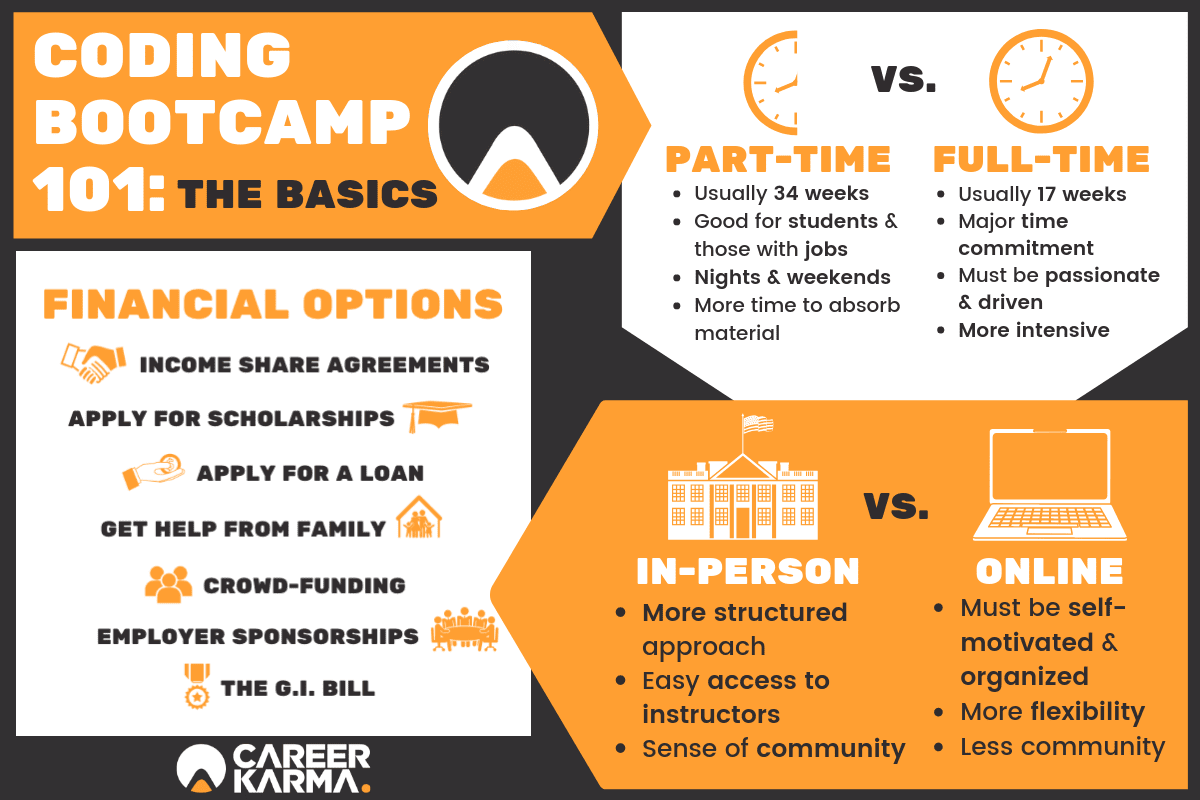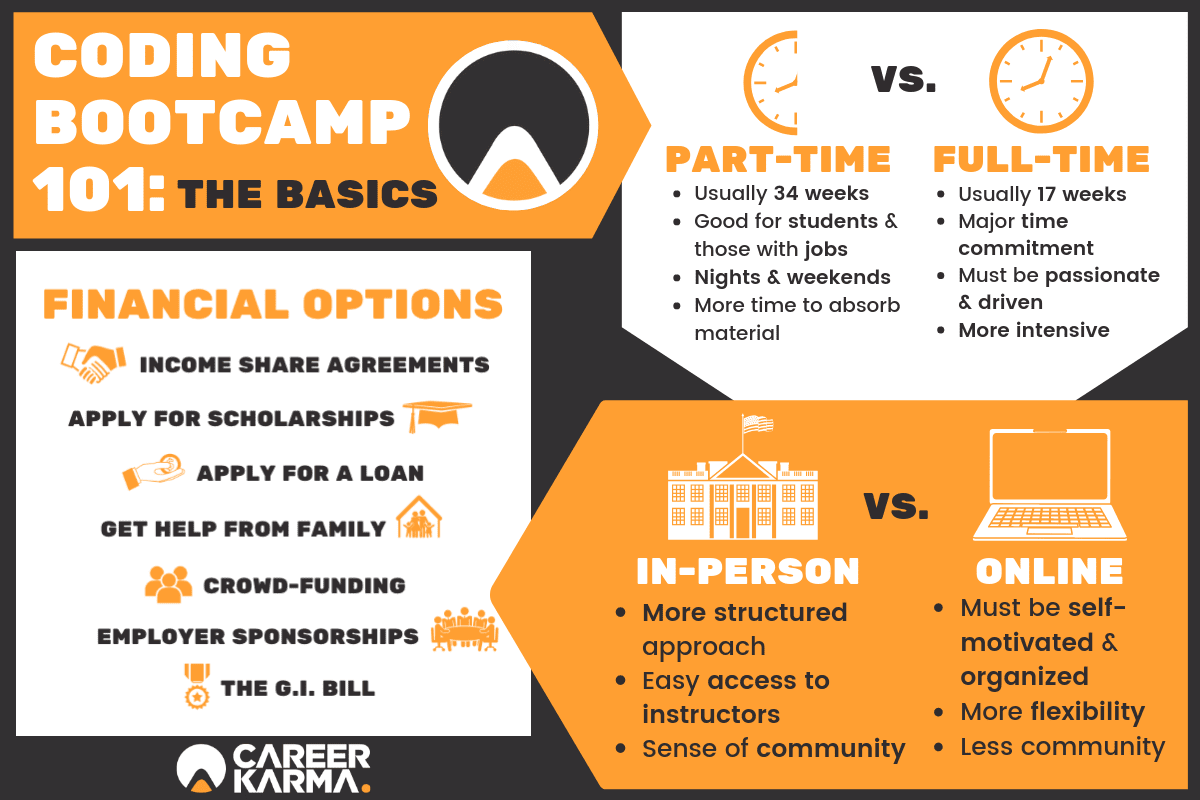Job Market Demand After Bootcamp: Can You Get A Job With Just Coding Bootcamp

Coding bootcamps offer intensive training in high-demand tech skills, promising a faster route to a tech career than a traditional four-year degree. However, understanding the actual job market demand and aligning skills with current trends is crucial for successful bootcamp graduates. This section examines the job market landscape for bootcamp graduates, comparing it to broader tech sector trends and providing insights into salary expectations.
The job market for software developers and related tech roles remains robust, consistently outpacing overall employment growth. While the tech industry experiences cyclical fluctuations, the long-term demand for skilled professionals continues to increase, driven by digital transformation across various sectors. Coding bootcamps, by offering focused training on specific in-demand skills, position graduates to capitalize on this demand, though competition is fierce and requires targeted job searching strategies.
In-Demand Tech Skills and Salary Ranges
Bootcamps typically focus on practical skills highly sought after by employers. The specific skills vary depending on the bootcamp’s specialization (e.g., web development, data science, cybersecurity), but some consistently in-demand skills include proficiency in popular programming languages, familiarity with relevant frameworks and libraries, and experience with version control systems. These skills translate into competitive salaries, varying based on experience, location, and specific role.
- Full-Stack Web Development: Skills include HTML, CSS, JavaScript, React, Node.js, and database management (SQL, NoSQL). Salary range: $60,000 – $120,000+ annually.
- Data Analysis: Skills include SQL, Python (with libraries like Pandas and NumPy), data visualization tools (Tableau, Power BI), and statistical analysis techniques. Salary range: $55,000 – $100,000+ annually.
- Cybersecurity: Skills include network security, ethical hacking, penetration testing, and security auditing. Salary range: $70,000 – $150,000+ annually (often higher with certifications).
- Mobile App Development (iOS/Android): Skills include Swift/Kotlin, Java, and relevant frameworks. Salary range: $65,000 – $110,000+ annually.
Average Bootcamp Graduate Salaries by Location and Role
Salary expectations for bootcamp graduates vary significantly depending on geographic location and the specific tech role. Major tech hubs generally offer higher salaries due to increased competition for talent and higher cost of living. The following table provides estimated average salaries; actual salaries can deviate based on individual experience and employer. Note that these are averages and may not reflect the full range of salaries earned.
| Role | San Francisco, CA | New York, NY | Austin, TX | Denver, CO |
|---|---|---|---|---|
| Web Developer | $95,000 | $85,000 | $75,000 | $78,000 |
| Data Analyst | $90,000 | $80,000 | $70,000 | $72,000 |
| Mobile App Developer | $105,000 | $90,000 | $80,000 | $85,000 |
| Cybersecurity Analyst | $115,000 | $100,000 | $85,000 | $90,000 |
Bootcamp Curriculum Effectiveness
Coding bootcamps offer intensive training in programming, aiming to equip graduates with the skills necessary for entry-level developer roles. However, the effectiveness of these programs varies significantly depending on the curriculum design, teaching methodologies, and the overall learning environment. Understanding the strengths and weaknesses of different bootcamp curricula is crucial for prospective students seeking a successful transition into the tech industry.
The effectiveness of a coding bootcamp curriculum is multifaceted. It’s not simply about the languages taught, but also about the depth of understanding, the practical application of learned concepts, and the development of crucial soft skills. A well-structured curriculum will balance theoretical knowledge with extensive hands-on experience, providing a robust foundation for future learning and professional development. Conversely, a poorly designed curriculum may focus solely on superficial knowledge, leaving graduates unprepared for the complexities of real-world development.
Curriculum Content and Structure
Different bootcamps emphasize different programming languages and frameworks. Some focus on full-stack development, covering both front-end (user interface) and back-end (server-side) technologies, while others specialize in areas like data science, mobile development, or cybersecurity. The effectiveness of a specific curriculum depends on the student’s career goals and the current market demand. For example, a bootcamp heavily focused on legacy technologies might not be as effective as one emphasizing in-demand languages like Python or JavaScript. The structure of the curriculum also plays a significant role. A well-paced curriculum allows sufficient time for each topic, preventing students from feeling overwhelmed and ensuring proper comprehension. A poorly paced curriculum may rush through important concepts, leading to knowledge gaps.
The Importance of Hands-On Projects and Portfolio Development
Hands-on projects are indispensable for solidifying theoretical knowledge and showcasing practical skills to potential employers. A strong portfolio, built through these projects, serves as tangible evidence of a bootcamp graduate’s abilities. Bootcamps that prioritize project-based learning and provide ample opportunities for portfolio development significantly increase their graduates’ job prospects. These projects allow students to apply their skills in realistic scenarios, troubleshoot problems, and learn to work independently or collaboratively, all crucial skills in a professional setting. For instance, building a functional e-commerce website or developing a data analysis application demonstrates proficiency in several key areas, making the candidate more attractive to recruiters.
Gaps Between Bootcamp Training and Real-World Job Expectations
Despite the intensive nature of bootcamps, there are often discrepancies between the skills taught and the expectations of employers. One common gap is the lack of experience in working with version control systems like Git, collaborative development environments, and agile methodologies. Bootcamps should emphasize these aspects to better prepare graduates for team-based projects and professional development workflows. Another gap can be the lack of experience in debugging complex code in a production environment. Bootcamps often focus on smaller, more manageable projects, which don’t always reflect the scale and complexity of real-world applications. Finally, soft skills, such as communication, teamwork, and problem-solving, are often under-emphasized, even though they are highly valued by employers.
Suggestions for Improving Bootcamp Curricula
To better prepare graduates for the job market, bootcamps should consider the following improvements:
- Integrate more real-world projects that mimic industry challenges.
- Dedicate more time to teaching version control systems (like Git) and collaborative development practices.
- Include modules on agile methodologies and software development lifecycle (SDLC).
- Incorporate workshops on soft skills, such as communication, teamwork, and problem-solving.
- Offer career services and job placement assistance, including resume building and interview preparation.
- Continuously update curricula to reflect the latest technologies and industry trends.
- Provide opportunities for networking with industry professionals through guest speakers, mentorship programs, and career fairs.
Networking and Job Search Strategies

Landing a job after a coding bootcamp requires a proactive and multifaceted approach. Success hinges not only on your technical skills but also on your ability to effectively network and present yourself to potential employers. This section Artikels strategies for maximizing your job search efforts.
Can you get a job with just coding bootcamp – Effective networking is crucial for bootcamp graduates. It’s about building genuine relationships within the tech community, not just collecting contacts. These connections can lead to invaluable job leads, mentorship opportunities, and insights into the industry.
Effective Networking Strategies, Can you get a job with just coding bootcamp
Building a strong professional network requires consistent effort and strategic engagement. The following methods are particularly effective for bootcamp graduates.
- Attend Industry Events: Meetups, conferences, and workshops offer opportunities to connect with professionals, learn about new technologies, and showcase your skills. Actively participate in discussions and exchange contact information.
- Leverage Online Platforms: LinkedIn is essential. Craft a compelling profile highlighting your skills and projects. Engage with industry leaders and participate in relevant groups. Utilize platforms like Stack Overflow to demonstrate your technical expertise and build your reputation.
- Informational Interviews: Reach out to professionals in your desired field for informational interviews. These conversations provide valuable insights, networking opportunities, and potential job leads. Prepare thoughtful questions beforehand and express genuine interest in their experiences.
- Alumni Networks: If your bootcamp has an alumni network, actively participate. Connect with former students who have secured jobs in your target area. They can offer guidance, mentorship, and referrals.
Resume and Cover Letter Creation
A well-crafted resume and cover letter are essential for capturing the attention of recruiters and hiring managers. They should be tailored to each specific job application, highlighting relevant skills and experience.
- Resume: Use a clean and professional template. Quantify your accomplishments whenever possible (e.g., “Increased website speed by 20%”). Focus on skills relevant to the job description. Include links to your portfolio and GitHub profile.
- Cover Letter: Tailor each cover letter to the specific job and company. Highlight your passion for the role and demonstrate your understanding of the company’s mission and values. Show, don’t tell – use specific examples to illustrate your skills and accomplishments. Concisely explain why you are a good fit for the role and the company.
Successful Job Search Methods
Bootcamp graduates have successfully utilized various methods to secure employment. A multi-pronged approach is often most effective.
- Online Job Boards: Sites like Indeed, LinkedIn, and Glassdoor are valuable resources. Regularly search for relevant job postings and tailor your applications accordingly.
- Networking Events: Attending industry events provides opportunities to meet recruiters and hiring managers directly. Prepare a concise elevator pitch to describe your skills and experience.
- Recruiters: Many recruiters specialize in placing tech talent. Connect with recruiters on LinkedIn and other platforms. They can provide valuable insights into the job market and potential opportunities.
Building a Strong Online Presence
In today’s digital age, a strong online presence is crucial for attracting potential employers. A well-maintained LinkedIn profile and portfolio website are essential.
- LinkedIn Profile: Complete your profile with a professional headshot, detailed work experience (including bootcamp projects), and skills endorsements. Actively engage with posts and participate in relevant groups.
- Portfolio Website: Showcase your best projects through a portfolio website. Include a brief description of each project, highlighting the technologies used and the problems solved. Use platforms like GitHub Pages or create a custom website to host your portfolio.
Success Stories and Challenges

Coding bootcamps offer a fast-track route into tech careers, but the path isn’t always smooth. Success hinges on individual dedication, effective learning strategies, and a proactive job search. This section explores both the inspiring success stories of bootcamp graduates and the common challenges they face.
Many individuals have successfully transitioned careers after completing coding bootcamps. Their experiences highlight the potential of intensive training programs, but also the importance of preparation and perseverance.
Successful Career Transitions
Consider Sarah, a former teacher who enrolled in a full-stack web development bootcamp after realizing her passion for technology. During the intensive 12-week program, she excelled in projects, actively participated in group coding sessions, and built a strong portfolio showcasing her skills. Her diligent job search, involving networking at meetups and applying to numerous companies, landed her a junior developer position at a rapidly growing startup. Similarly, Mark, a marketing professional, transitioned to a data analyst role after completing a data science bootcamp. He leveraged his existing analytical skills and supplemented them with the technical knowledge gained during the program. His carefully crafted resume and targeted job applications, highlighting his newfound data analysis skills, resulted in a successful career change.
Challenges Faced by Bootcamp Graduates
While bootcamps provide valuable skills, graduates often face challenges. The highly competitive tech job market requires a strong portfolio, effective networking, and consistent effort. Some common hurdles include:
- Intense Competition: The sheer number of bootcamp graduates entering the job market creates a competitive landscape.
- Lack of Experience: Bootcamps provide foundational knowledge, but employers often prefer candidates with practical experience.
- Salary Expectations: Negotiating salaries can be challenging, especially for entry-level positions.
- Maintaining Momentum: The fast-paced nature of the bootcamp can make it difficult to maintain the same level of intensity during the job search.
Career Paths: Bootcamp vs. Traditional Computer Science Degree
Comparing career paths reveals distinct advantages and disadvantages of each approach. While a traditional CS degree provides a broader theoretical foundation, bootcamps offer a more focused, practical approach with quicker entry into the workforce.
| Aspect | Bootcamp Graduate | Traditional CS Graduate | Notes |
|---|---|---|---|
| Time to Employment | Shorter (typically within months) | Longer (typically 4+ years) | Bootcamps prioritize quick job placement. |
| Cost | Lower upfront cost | Higher (tuition, fees, living expenses) | Bootcamps are generally less expensive than a 4-year degree. |
| Curriculum Focus | Practical skills, specific technologies | Broader theoretical foundation, multiple specializations | Bootcamps focus on in-demand skills. CS degrees offer more flexibility. |
| Starting Salary | Potentially lower initially | Potentially higher initially, but higher debt | Salary depends on factors like location, skills, and experience. |
Continuous Learning and Professional Development
The tech industry is constantly evolving. Continuous learning is crucial for long-term success. Bootcamp graduates should actively engage in ongoing professional development through online courses, workshops, conferences, and personal projects to stay ahead of the curve. This commitment to lifelong learning ensures adaptability and competitiveness in the dynamic tech landscape. Staying updated with new technologies and frameworks is paramount to career advancement and maintaining relevance in the industry.


Tim Redaksi